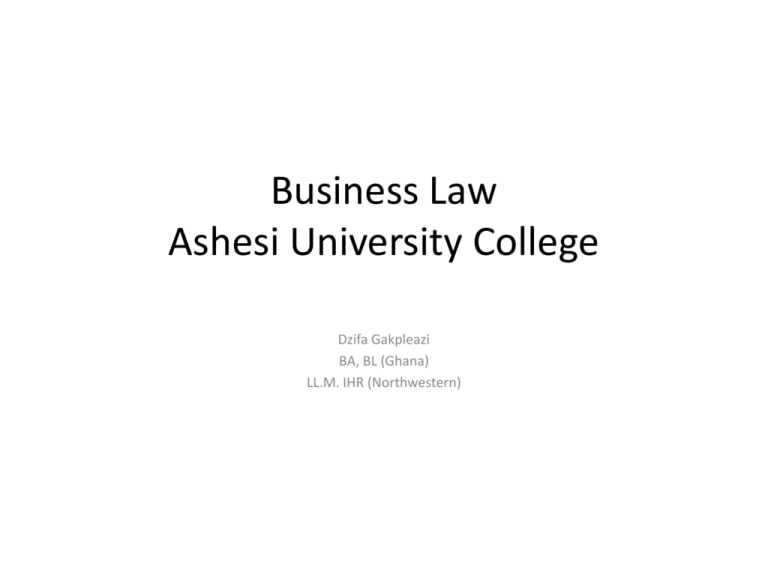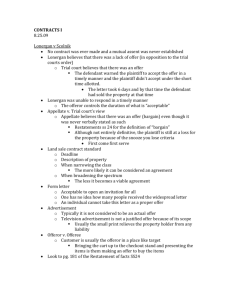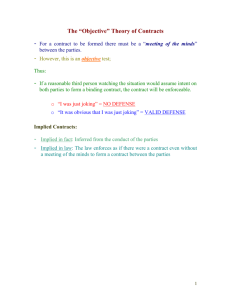Contracts - carlprosper4nugs
advertisement

Business Law Ashesi University College Dzifa Gakpleazi BA, BL (Ghana) LL.M. IHR (Northwestern) Contracts Law For today’s class: • What a contract is, • Essentials of a contract – Offer – Acceptance – Consideration – Intention to create legal relations – Capacity What is a contract? • An agreement between two or more parties creating legal rights and obligations which the law will recognize and the courts will enforce. • Contracts are generally not imposed but created by voluntary agreement or promises of parties • Involves the exchange of promises • The promises form the content of the contract • Courts give effect to what the parties agreed to • A contract can be unilateral or bilateral • A unilateral contract is one made to the whole world at large. Anybody who performs the act that is being required to be done is said to have accepted the offer. E.g., Afia announces to the whole world that if anyone should return her lost dog she will reward the person with a huge sum of money. Once someone finds the dog Afia must pay up. • A bilateral contract on the other hand is between two persons or between several parties. Essentials of a Contract • • • • • Offer Acceptance Intention to create legal relations Consideration Capacity to contract Offer • An offer is a statement, proposition or conduct by one person(s) to another person(s) expressing a willingness to be held to that statement, proposition or conduct. • The party making the offer is called the offeror or promisor and the party to whom it is made is called the offeree or promisee. • Example: Kofi says to Ama, I will sell my phone to you for GHC 50. Kofi is the offeror and Ama is the Offeree. • An offer can be written, oral, partly written and partly oral or by conduct • An offer must have terms which must be clear, certain and definite, not vague and ambiguous • Note that the courts are not likely to enforce a contract with uncertain, vague and ambiguous terms • Offers must be communicated [to the offeree or his authorised agent] • When a party promises to keep an offer open for acceptance for a specified time he is bound, even in the absence consideration, to keep the offer open under Ghanaian law (section 8 of the Contracts Act) unlike common law where an offeror is not bound by the time within which he is to keep the offer open unless there is consideration. What are not offers? • Invitation to treat: invitations to the public to make offers or attempts to initiate the bargaining process. • Distinguishing feature: there is no intention to create legal relations • Indicates that the person is willing and ready to receive offers • A person making the invitation is not bound to accept any offers in response Examples of invitation to treat • • • • Display of goods in a shop Adverts Auction sales Tenders • Display of goods in a shop – Pharmaceutical Society of Great Britain v. Boots Cash Chemist (southern) Ltd: the plaintiffs accused the defendant of violating the Pharmacy and Poisons Act 1933. This required that certain medicines be sold under the supervision of a registered pharmacist. The defendants on the other hand run a self service shop. When customers were picking these medicines up from the shelves there was no supervision. The registered pharmacist was however at the cash register to supervise the sale of these medicines. Held: defendants were not making offers to their customers rather they were inviting them to treat to which they would accept or reject when the customers get to the cash register. – Fisher v. Bell: display of goods in a shop window with prices attached to them does not constitute offers but an invitations to treat. • Adverts – Harrison v. Nickerson: an auctioneer advertised the sale by auction of certain goods in the newspapers indicating the venue of the sale and the fact that the highest bidder would be the buyer. A buyer relied on the advert and travelled to the venue but realized some of the items advertised which he had intended to buy were not put up for sale. He sued the auctioneer for compensation for his travel expenses to the venue. Issue: whether the advert was an offer which the bidder accepted by travelling to the venue of the auction. Held: the advert was not an offer but a mere declaration of intention that lacked a contractual intent. Not every declaration of intention to do a thing creates a binding contract on those who act upon it. However, in some circumstances, promises contained in adverts can constitute valid offers if there is a clear indication of the intention of the offeror to enter into a contract with whoever acts on the promise contained in the promise. – Carlill v. Carbolic Snowball: a pharmaceutical company caused an advert stating that anybody who used a certain product, in the manner specified in the advert and still contracted the illness which the product was meant to cure, the company would compensate that person. Plaintiff in reliance on the advert bought and used it in the manner specified in the advert and still contracted the illness. She sued for compensation. Issue: whether promise of compensation was an offer or invitation to treat. Held: it was an offer. There was a clear indication by the company of its intention to be bound by the promise if what it said in the advert was complied with. Once it was complied with the company was obliged to honour its promise. • Auction sales – Auction Sales Act, 1989, (PNDCL 230) The advert of the auction is an invitation to attend and make offers in the form of bids which the auctioneer may reject or accept. Each has the right to withdraw anytime before acceptance. Acceptance is usually indicated by the fall of the auctioneer’s hammer. Without reserve: auctioneer is prohibited from withdrawing the item after a bid has been made and must sell to the highest bidder. Bidder may withdraw before the fall of the hammer With reserve: item will not be sold below the reserve price. Auctioneer is not bound to sell the item to the highest bidder if the highest bid falls below the reserve price • Tenders Termination of offers There are five ways in which an offer can be terminated: • Revocation: withdrawal of the offer before it is accepted. It must be communicated to the offeree • Rejection and Counter-Offer: the offeree to whom the offer is made rejects the offer but puts on the table a new offer. This new offer by the offeree is called a counter offer. The counter offer rejects, destroys and terminates the original offer. • Lapse of time: the offeror in making his offer may stipulate a time within which the offeree should accept. Once the time lapses the offer comes to an end. • Non-occurrence of condition: an offer can also be subject to a condition, and if the condition does not occur or is not fulfilled, then the offer may come to an end. • Death: If one of the parties dies then the offer comes to an end. Acceptance When an offeror makes an offer and the person to whom it is made agrees or consents to the contents of the offer one is said to have accepted the offer thus acceptance. – It must be to the whole offer and not parts of it. Any qualification, deviation etc amounts to a counter offer subject to acceptance and the old offer is terminated. Hyde v. Wrench: 6th June, Wrench offered his farm to Hyde for £ 1000, 8th June, Hyde offered to buy it for £ 950. wrench wrote back to reject Hyde’s offer and Hyde subsequently wrote back accepting Wrench’s original offer of £1000. Wrench refused to sell. Held: no contract, by his letter of 8th June, Hyde had rejected the original offer and therefore that offer was no longer available for acceptance. Hyde’s proposal of a £ 950, was a counter offer, it effectively killed the original offer and because the counter offer was rejected by Wrench it meant there was no offer. – Must be expressed, either in writing or oral – Only the offeror can accept an offer. E.g., an offer made by Kofi to Ama, cannot be accepted by Akos – Its effect is that it transforms the offer into a binding agreement – Silence does not constitute acceptance. Neither can the offeror impose silence as an indication of acceptance on the offeree. – It must be communicated to the offeror to be effective Mode of communication • Should be that indicated by the offeror unless it is waived • If no mode indicated, the most convenient and effective means. The postal rule: acceptance by post is effective as soon as the letter is addressed, stamped and posted. – It does not matter if the letter is destroyed, or lost and never reaches the offeror – An offeree cannot revoke an acceptance once the letter is posted, even if it has not reached the offeror – applies only to letters of acceptance and not revocation Exception: this rule can be waived by the parties Exception to the communication rule: Unilateral contracts: these involve promises which can only effectively be accepted by acts. E.g. return of lost items for a handsome reward. A accepts this offer not by communicating acceptance but by returning the lost items.







